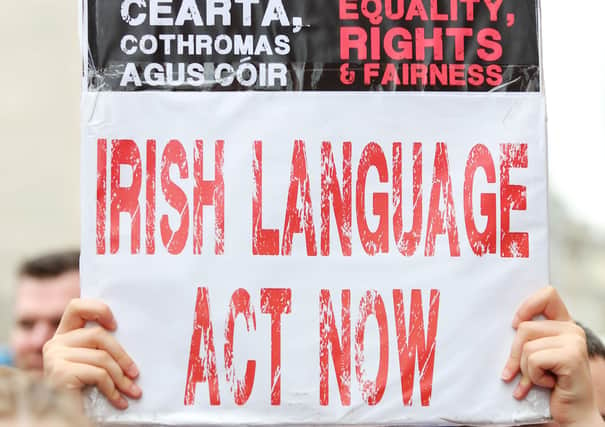Irish language ‘rights’ in reality means legally-enforceable special privileges for Irish-speaking nationalists


We were pleased to allocate some of this to the Irish language sector given the high level of community engagement which they brought to their work.
Fast forward to 2021, and the context has changed. Sinn Féin is now exploiting Ulster’s cross-community Irish language tradition to undermine our British connection, striving to construct a regressive political system rooted in ethnic identity.
Advertisement
Hide AdAdvertisement
Hide AdIn response the British and Irish governments have proposed “a new framework” to be fleshed out by an “Office of Identity and Cultural Expression” (OFFCULT), joining the Commissions for Equality, Human Rights and Community Relations in the business of Pooteresque wind delivery.
OFFCULT would oversee two commissioners, one for Irish and one for Ulster Scots. The former would have greater powers, and the disparity between them would increase over time.
From 2011 to 2016, I chaired a group of experts who advised the Culture Minister on a development programme for Ulster Scots. We worked with researchers and community activists to deliver an excellent programme of pilot projects, and produced a strong business case for a permanent Ulster-Scots Academy. But the minister decided to drop this work into the Ulster-Scots Agency, where it sank without trace.
Meantime, her department’s support for Irish has grown exponentially.
Advertisement
Hide AdAdvertisement
Hide AdThe “new framework” would include an Irish language act. If this mirrors Wales, English and Irish would have equal status, irrespective of common sense and practicality. Public bodies would have to publish schemes explaining how they would promote Irish. There would be new jobs for Irish language activists and lawyers, and huge inefficiencies in public administration.
The fact that Irish is deemed to be the national language in the south permits employers to discriminate against people who do not speak it: candidates can be awarded extra points for modest fluency in Irish.
The campaign for Irish language “rights” is in reality a demand for legally-enforceable special privileges for the Irish-speaking nationalist community. To concede this would further embed tribalism in our public life, when we should be doing the opposite.
As we emerge from the Covid crisis, it would be madness to spend money on more redundant functionaries whose activities can only take us backwards.
Advertisement
Hide AdAdvertisement
Hide Ad• William Beattie Smith is author of ‘The British State and the Northern Ireland Crisis 1969-73,’ published by the US Institute of Peace
——— ———
A message from the Editor:
Thank you for reading this story on our website. While I have your attention, I also have an important request to make of you.
With the coronavirus lockdown having a major impact on many of our advertisers — and consequently the revenue we receive — we are more reliant than ever on you taking out a digital subscription.
Subscribe to newsletter.co.uk and enjoy unlimited access to the best Northern Ireland and UK news and information online and on our app. With a digital subscription, you can read more than 5 articles, see fewer ads, enjoy faster load times, and get access to exclusive newsletters and content. Visit https://www.newsletter.co.uk/subscriptions now to sign up.
Advertisement
Hide AdAdvertisement
Hide AdOur journalism costs money and we rely on advertising, print and digital revenues to help to support them. By supporting us, we are able to support you in providing trusted, fact-checked content for this website.
Alistair Bushe
Editor